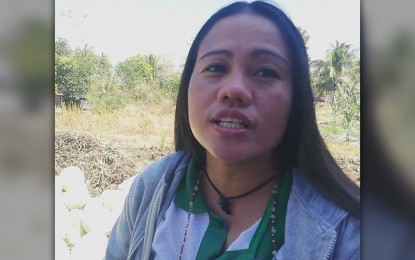
PREPARED. Maritess Balling, municipal agriculturist of Bangued, Abra, on Thursday (March 14, 2024) said farmers in their town are expected to harvest rice for the second cropping season after the Department of Agriculture (DA) and the National Irrigation Administration (NIA) ensure adequate water for the farms through the repairs of typhoon and earthquake-hit irrigation facilities. She said DA, NIA and the municipal government also distributed solar-irrigation facilities. (PNA photo by Liza T. Agoot)
BANGUED, Abra – Repair of irrigation facilities and distribution of solar irrigation systems by national government agencies and the local government have provided adequate water here, allowing farmers to ensure bountiful harvest amidst the El Niño.
Municipal agriculturist Maritess Balling, in an interview on Thursday, said farmers from rice-producing villages here, which include Dangdangla, Makray, Patucannay, Cosili East, Cosili West, Angad, Palao, Sao-atan and Lipcan have planted rice for the second cropping, ready for harvest by April or May.
"These areas have existing irrigation facilities sourced from Abra River," she said.
Balling said the National Irrigation Administration (NIA) and the Department of Agriculture (DA) have fixed irrigation facilities damaged by recent earthquakes and flooding.
She said these agencies, as well as the local government, have also distributed solar irrigation systems.
Balling said this town, which is the province’s capital, is 60 percent rain-fed and 40 percent irrigated, thus irrigation canals are continuously upgraded.
"The rain-fed areas are also continuously being provided with solar irrigation facilities to allow them to grow other plants that are heat-resilient and do not require a lot of water like legumes,” she added.
Balling disclosed that Bringas dam's rehabilitation will start in the last quarter of the year, and this will later on allow second cropping in areas currently unreached by existing irrigation systems.
She said the El Niño phenomenon currently has little impact in the town because "the Abra River, from the town of Tayum, continues to be a lucrative water source beneficial to our farms.”
However, she said that if the phenomenon’s effects will be felt, the municipal government, along with DA and NIA, are ready to provide emergency employment to farmers who will be tapped to clean irrigation canals and prepare it for the rainy season. (PNA)
